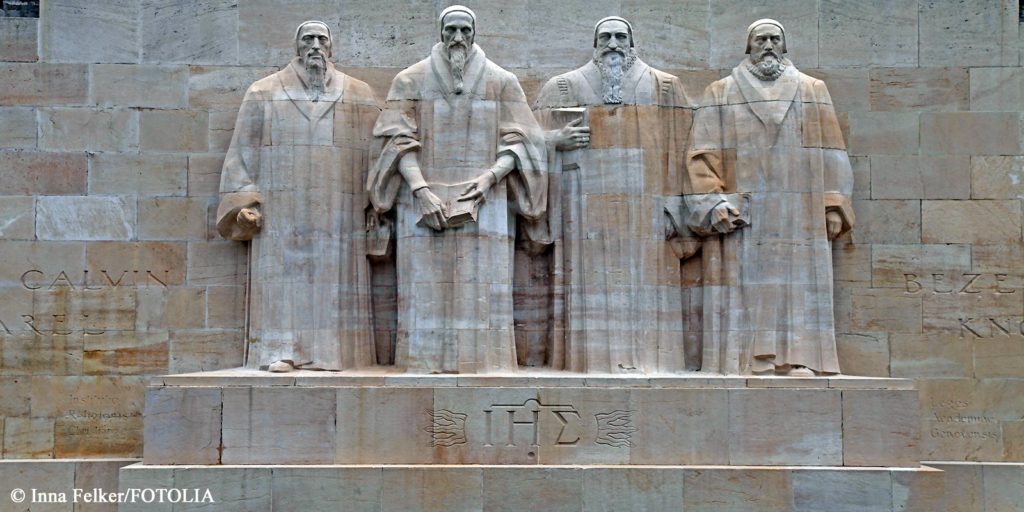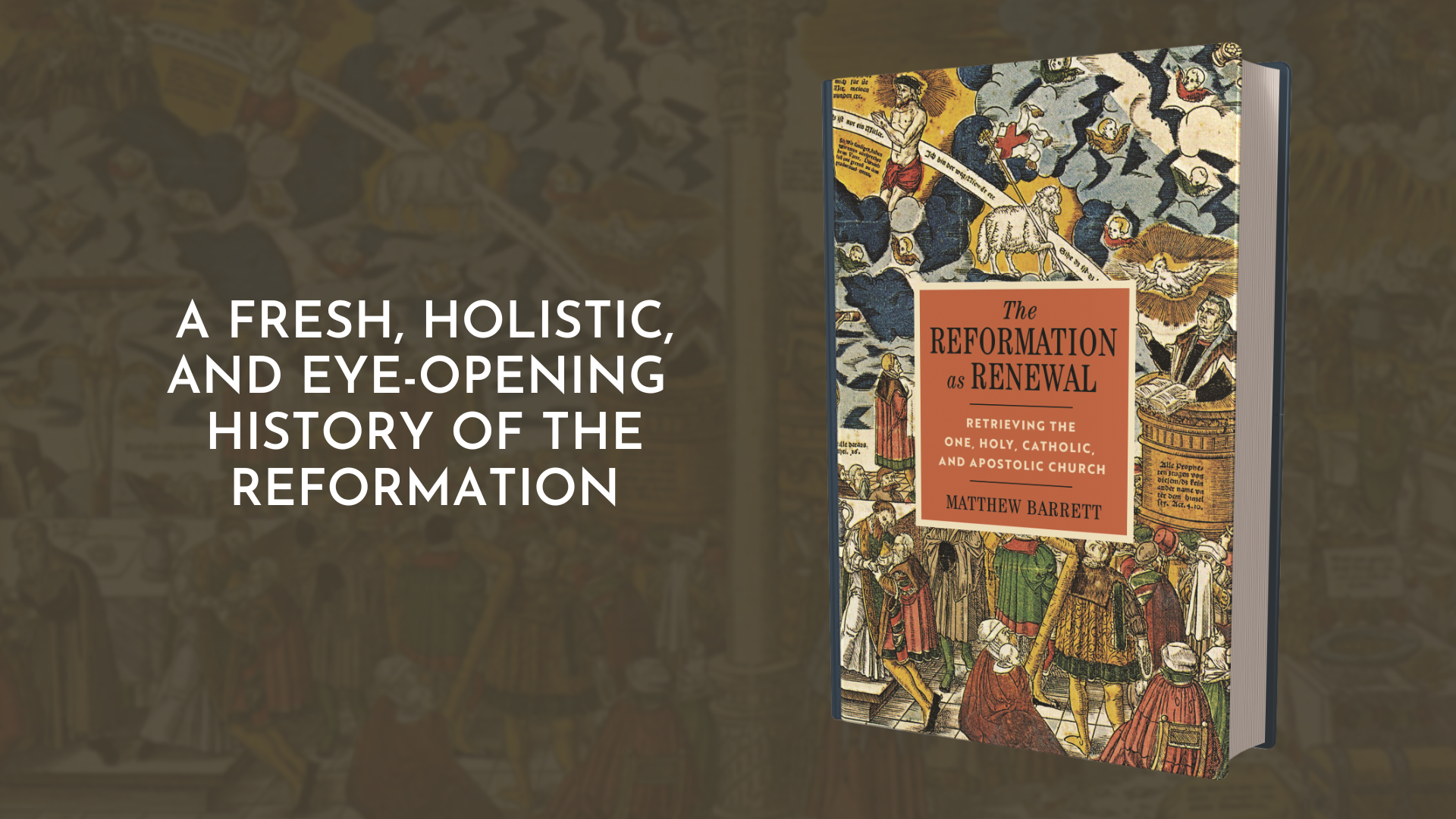
A Reformation Road Map
In celebration of Reformation Day this week, we have invited Carl Trueman, one of our Credo Fellows, to share some thoughts. The following is his Foreword to Matthew Barrett’s book, The Reformation as Renewal: Retrieving the One Holy Catholic and Apostolic Church, which is on sale this week only. Trueman calls for a new day in Reformation scholarship, one that moves beyond old, tired caricatures. He gives us a Reformation road map.
The pathway between scholarly breakthroughs and their popular reception is neither a swift nor a simple one. And this is nowhere more true than with the reception of theology within the church. This pathway between the insights of scholarship and the attitude of the church can seem long and arduous, especially since it is embedded within a broader culture of strong individualism with an antispeculative and pragmatic ethic. An understandable fear of novelty has often been akin to error or even heresy, and there has long been a deep suspicion of intellectuals and scholars in American conservative Protestantism, particularly in its evangelical variety.
 There have been many exciting scholarly developments in the field of historical theology in the years since the Second World War. Heiko Oberman redrew the map from the late Middle Ages to the Reformation. As with all great scholars, he built upon the insights of an earlier generation, such as those offered by Joseph Lortz, who drew attention to the clear connections between late medieval theological paradigms and Martin Luther’s Reformation theology. Unlike Lortz, Oberman set aside time-worn and time-hardened Catholic-Protestant polemics to assess late medieval nominalism and Martin Luther on their own merits. In so doing, he freed Reformation studies from the distorting effects of later ecclesiastical posturing and opened the field in new and fruitful ways for the next generation of scholars. His student, David C. Steinmetz, took up the challenge of theological genealogy as it had been developed by Oberman and applied it to the history of exegesis. Then, Steinmetz’s student, Richard A. Muller, applied both approaches to Reformed Orthodoxy and extended the narrative into the early eighteenth century. The older theological approaches began to crumble as they faced the rising challenge of epistemology.
There have been many exciting scholarly developments in the field of historical theology in the years since the Second World War. Heiko Oberman redrew the map from the late Middle Ages to the Reformation. As with all great scholars, he built upon the insights of an earlier generation, such as those offered by Joseph Lortz, who drew attention to the clear connections between late medieval theological paradigms and Martin Luther’s Reformation theology. Unlike Lortz, Oberman set aside time-worn and time-hardened Catholic-Protestant polemics to assess late medieval nominalism and Martin Luther on their own merits. In so doing, he freed Reformation studies from the distorting effects of later ecclesiastical posturing and opened the field in new and fruitful ways for the next generation of scholars. His student, David C. Steinmetz, took up the challenge of theological genealogy as it had been developed by Oberman and applied it to the history of exegesis. Then, Steinmetz’s student, Richard A. Muller, applied both approaches to Reformed Orthodoxy and extended the narrative into the early eighteenth century. The older theological approaches began to crumble as they faced the rising challenge of epistemology.
Oberman, Steinmetz, and Muller, along with their doctoral students and many other academics influenced by their work, effected a revolution in how the relationship between the Middle Ages, the Reformation, and the early modern period is understood in terms of intellectual and theological developments. It became clear that the accepted Protestant readings of, say, Aquinas were nonsense and unsustainable in light of the primary texts. The old paradigm of Reformation theology as a radical break was finally put to bed as it became clear that Reformation theology was built upon a medieval heritage (particularly theology proper) even as it broke with that medieval heritage on aspects of soteriology, sacraments, and authority.
Matthew Barrett’s new book is such a gem. It bears all the marks with which readers of his earlier work on the doctrine of God will be familiar. Share on XBut historical scholarship was not only transforming scholarly understanding of the Reformation. In the field of patristics the last twenty years have seen some equally remarkable developments. Scholars such as Lewis Ayres and Khaled Anatolios have reworked the scholarly understanding of Nicene orthodoxy. We now have a much better grasp of what terms such as hypostasis and ousia meant in the fourth and fifth centuries, and a deeper understanding of what lay at the heart of the doctrine of the Trinity. Old clichés that drew sharp divisions between East and West, between the Cappadocians and Augustine, have been put to the scholarly sword. Just as the Catholic-Protestant paradigm was shown to be a distorting lens through which to understand the Reformation, the division between Rome and Constantinople has now been revealed as similarly problematic. Institutional divisions are stark and clear; intellectual relationships are far more subtle and complex.
All of these scholarly developments inevitably have implications for the church, especially Protestant and evangelical churches. Some of the implications are disturbing. As scholars such as James Dolezal, Matthew Barrett, and Stephen Duby have appropriated the fresh insights into the classical doctrine of God that lay behind the theology of such august Protestant documents as the Westminster and Second London Confessions, it has become clear that much of modern evangelical writing on this subject would not have been recognized as orthodox by the Reformers and their heirs. While such deviation was no doubt pursued in good faith, the rejections of simplicity, immutability, and impassibility—as classically understood—place much of contemporary evangelical theology closer to the biblicist and highly problematic Socinianism of the early seventeenth century than to the Trinitarian orthodoxy of the church catholic. A return to orthodoxy on the doctrine of God is belated, but it can only benefit the church. Socinianism was a dead end in the Reformation and can only prove so again today.
Other implications are more positive. Protestantism long labored under the accusation from Catholics that it represents a set of deviant innovations. Now we know—and can prove—that this is not the case. To the extent that Protestantism is confessional, to the extent that it is committed to the teaching embodied in a document such as the Westminster Confession, it is catholic and represents what Calvin and his contemporaries claimed it to be: not a repudiation of the church’s tradition but an affirmation of the church’s true tradition over against the fallacious additions under which it had been buried.
Yet the path from scholarly breakthrough to church life is never easy or straightforward. The works of the scholars I’ve mentioned is often highly technical. Their work frequently assumes both a wide knowledge of historical context and a deep familiarity with the history of scholarly debate. What is needed, therefore, is for one of them to outline an accessible road map that makes the salient points comprehensible to a wider audience and makes clear the implications of these fresh insights for Christians today.
This is why Matthew Barrett’s new book is such a gem. It bears all the marks with which readers of his earlier work on the doctrine of God will be familiar. It is not overburdened with technical jargon, nor is it misleadingly simplistic. It builds upon the best scholarship, yet does so in a manner the layperson and student alike will find accessible. And it gently guides the reader into a deeper knowledge of the Reformation and its aftermath in a way that highlights the theological catholicity of the movement. It is a key tool for bridging that gap between scholarly research and the everyday life of the student and the church.
No doubt some of Barrett’s claims will prove hard to swallow for those unfamiliar with the vast and compelling scholarship of the last sixty years. There is always a time lag on such things. Those who still peddle old and discredited caricatures of Thomas Aquinas, for example, will no doubt be around a while longer—careers in some quarters depend upon it. But careful reading of texts and thoughtful scholarship will, in the long run, defeat the tendentious polemics of a bygone age. Matthew’s book is a gracious contribution to that process, for which we all now owe him a debt of gratitude.

